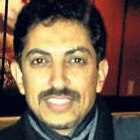14 Feb 2012 | Middle East and North Africa
After the events of 13 March 2011 and the shameful attack on University of Bahrain (UoB) students by a group of militias that supported by the Bahraini regime, the UOB administration dismissed more than 400 innocent students and many of them get arrested. I was one of the students expelled because of participating in some protests in and outside the university.
A while later, the administration decided to bring the expelled students, but not all of them, back for the start of the next semester. There are more than 30 banned who have not been allowed to continue studying at University of Bahrain. The university changed to a place that you could not study in; it was like a military base with scattered checkpoints. Many students could not attend their classes on time because of the checkpoints. Barbed wire surrounded everything. The General Directorate of Criminal Investigation (CID) agents were in every corner. Armed forces were spreading at all of the gates, and there were more pictures of the regime than educational boards and banners in the university.
In addition, two female students kidnapped from the campus were tortured by masked people with the assistance of University of Bahrain security.
A few months ago, University of Bahrain administration told the rest of the expelled students that they can continue studying by the beginning of the next term. Afterwards, a group of regime supporters protested at the campus against the decision, but neither the security team nor the Ministry of Interior (MoI) forces tried to stop them by saying it was peaceful, proving the double standards about dealing with protests and gatherings
Mohammed Bahar is a University of Bahrain student who was dismissed during the crackdown last year
14 Feb 2012 | Middle East and North Africa
The Bahraini government spends thousands and thousands of dollars on PR companies every month. Their purpose of using such companies is simple: to project a positive image of Bahrain while also tempering any negative press coverage.
One such company is Qorvis, a Washington D.C. Based PR firm that receives a monthly stipend from the Bahraini government of 40,000 USD. They operate by attempting to influence journalists or opinion makers through the strategic placement of favourable reports defending the actions of the Bahrain government. Their methods range from circulating articles on outlets such as PR Newsire, to emailing journalists directly in order to defend the actions of the regime.
Some PR companies are also suspected of engaging in more clandestine activities, such as creating sock puppet accounts on Twitter to spread pro-regime propaganda. The revelation that BGR Gabara, yet another British PR firm reportedly working for Bahrain, planned to organise a Twitter campaign on behalf of Kazakh children exacerbated such concerns. Given that the US government are also involved in such sock puppetry, there is no reason the private sector won’t seek to profit from it.
Another dimension of PR work is minimising negative publicity. For example, the Guardian recently took down an article from its Comment is Free section after a British PR firm representing the Bahrain International Circuit made a complaint. The article, which Dragon Associates argued contained “considerable inaccuracies”, threatened to derail Bahrain’s plans to host the F1 Grand Prix this year. It has yet to be put back up, either in its original or altered form.
Perhaps the most worrying players in the murky world of PR are the likes of Olton, a British intelligence firm who officially have a contract with the Economic Development Board, but who also appear to work for Ministry of the Interior. As well as providing “reputation management”, their software is reported to be able to identify “ringleaders” through using social media such as Twitter and Facebook. Given that dozens of students were dismissed from university based on evidence garnered from their Facebook profiles, many are demanding to know who is doing the watching.
The threat posed by unscrupulous PR companies to freedom of speech should not be underestimated. It is bad enough that they distort the public sphere in exchange for money, yet it is the rise of companies like Olton that is the most alarming, for when does intelligence gathering become ‘evidence’ gathering? Furthermore, when does “reputation management” involve facilitating the silencing of those narratives that oppose the desired rhetoric of the paying client?
Marc Owen Jones is a blogger and PhD candidate at Durham University. He tweets at @marcowenjones
13 Feb 2012 | Bahrain Letters, Middle East and North Africa
 Prominent Bahraini human rights defender Abdulhadi Al-Khawaja has been serving a life sentence since April 2011 for his involvement in anti-government protests last year. Al-Khawaja, who is also a Danish citizen, recently wrote a letter from prison to the Minister of Foreign Affairs to push for his release
Prominent Bahraini human rights defender Abdulhadi Al-Khawaja has been serving a life sentence since April 2011 for his involvement in anti-government protests last year. Al-Khawaja, who is also a Danish citizen, recently wrote a letter from prison to the Minister of Foreign Affairs to push for his release
(more…)
11 Feb 2012 | Middle East and North Africa, minipost, News
US Citizens Huwaida Arraf and Radhika Sainath were arrested by Bahraini security forces in the capital Manama on Saturday (11 February) during a peaceful protest.
Protesters had marched into the city center to reestablish a presence of nonviolent, peaceful protest leading up to the 1-year anniversary of the Arab Spring uprising in Bahrain on 14 February.
Huwaida and Radhika are in Bahrain as part the <a href=”www.witnessbahrain.org”>Witness Bahrain initiative</a>, which arrived in Bahrain in response to a call by Bahraini democracy activists for international observers.

